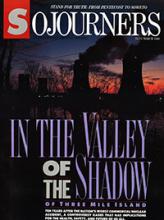One of the more sorrowful mysteries of American culture was recently suggested to me by a friend as a topic for this column. The mystery is, simply put, Why don't white people like rap music?
Of course, the question implies some over-generalized assumptions. These days there is a sizable white audience for rap among the high school and college crowd. But among the palefaced late-twenties to thirty-somethings who comprise the bulk of my, and my friend's, peers and party mates, the most vital and innovative contemporary black music around is still met mostly with willful ignorance and occasional condescension.
There are a number of complicated reasons why rap, unlike so many other forms of black popular music, has thus far failed to jump the color bar. One of them is aesthetic. Rap disdains European musical conventions, even those of Celtic origin which have historically formed the melodic sinew and harmonic muscle of blues-R&B-rock and roll. Rap is entirely about subtleties of rhythm, sonic texture, and attitude, and as such it is probably the most Afro-centric music to originate on this continent in this century. Unlike disco or Michael Jackson, rap doesn't meet white listeners halfway. Instead rap challenges us Caucasians to retrain our ears, and other body parts, to meet its specifications.
Aesthetic difficulty may partly explain why rap has yet to take America's Top 40 by storm. But that is no excuse for the educated, middle-class, alternative-leaning sector of the white audience which usually wears its allegiance to obscure, non-mainstream sounds on its avant-garde sleeve. We're talking here about the neo-folkie, rock audience that religiously follows the musical tourism of Great White Poobahs such as David Byrne and Paul Simon to the farthest reaches of the globe (South Africa, Senegal, Brazil, etc.) and into the deepest recesses of the record store "Import" bin, meanwhile largely ignoring home-grown American Afro-pop.
Read the Full Article
